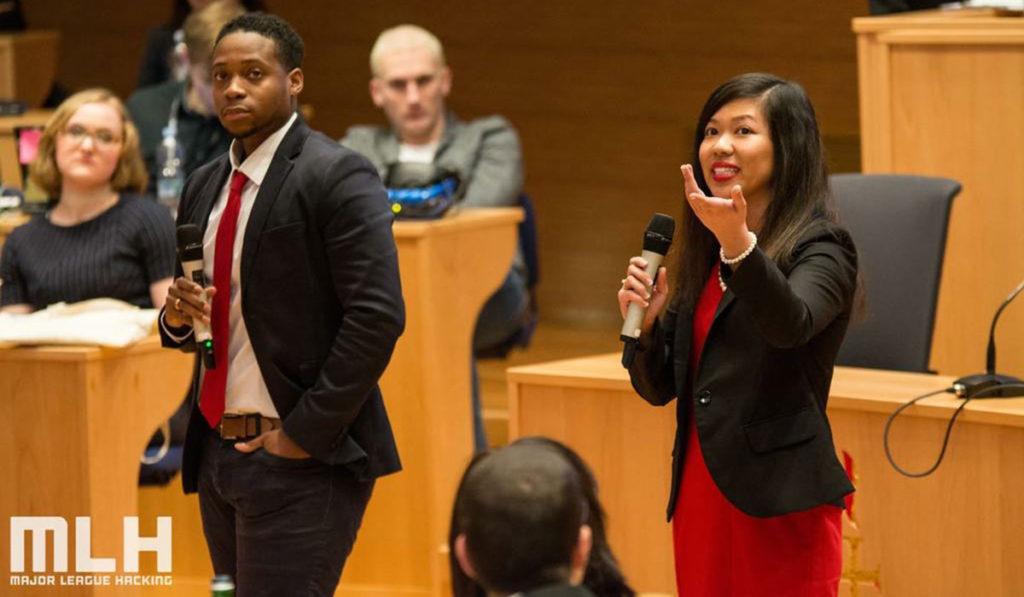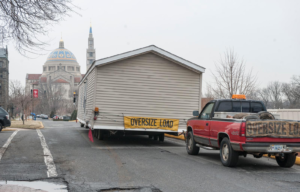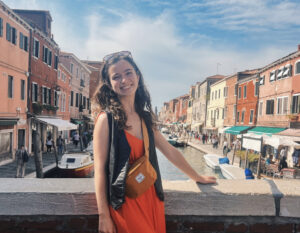Catholic Students Participate in ‘VHacks’ Competition in Rome

Catholic students Emma Flanagan and LeQuan Clinton presented their idea to the audience. Courtesy of Michael Monaghan

By Liz Friden
This past spring break, most Catholic University students spent their week off school resting, having fun with friends, or volunteering. A group of five Catholic students spent their spring break differently, participating in VHacks, the first hackathon held at the Vatican in Rome, Italy.
Emma Flanagan, a sophomore marketing major; LeQuan Clinton, a senior architecture student; Michael Monaghan, a senior computer science major; Vy Bui, an electrical engineering doctoral candidate; and Van Lam, a biomedical engineering doctoral candidate, traveled to Rome, where they participated in the first annual Vatican Hackathon. Their team won second place overall against the top 25 universities in the world.
The 36-hour competition took place on the weekend of March 8-11th, the last weekend of Catholic University’s spring break. A total of 120 students with all different faith-backgrounds came together for a weekend of innovation and project creation. They leveraged their technology to address current global problems. This was an event to promote collaboration among youth leaders across diverse academic, ethnic and religious backgrounds. Another aspect of the event was to encourage value-based institutions to embrace technology to further their missions.
Each of the 25 teams were assigned a topic at the start of the 36 hours. Flanagan explained how her team created an innovative solution to solve interfaith dialogue, one of the three challenges of the VHacks competition. The solution was called “Faithstrings”, a virtual-reality app that allows users to explore and learn about different faiths. It aimed to “connect individuals from across the world from one another to learn through a virtual reality shared experience and community platform.”
“Toward the end, about 75% of participants slept for last 3 hours,” Monaghan explained. “The rest, including myself, stayed up.”
Every team’s project was due at 9:00 AM and everyone presented as if it was a science fair. The winners were determined by a panel of experienced professionals across tech companies and the Vatican institution. They judged teams based on creativity, potential impact, feasibility, relevance to the topics provided and technological innovation.
Three finalists were selected in each category to give a slightly longer and more formal presentation in another building. Catholic’s group was among those chosen, and came in second place, winning $1000. In addition, they won an award from Salesforce for best implementation of their software.
Food was provided buffet-style for the entire duration of the competition. The students stayed in and worked in the Columbus hotel, less than a quarter of a mile away from the Vatican. The students were surrounded by professionals and students from all around the world.
“Everyone was very friendly,” Monaghan said. “There were priceless works of art everywhere we went, it felt like we were in the National Gallery of Art.”
Each team member was chosen to go to this event after each participated in an event at CUA earlier this semester, called Hackathon for Homelessness. Hackathon for Homelessness took place on January 27th, and all five students who went to Rome competed on different teams against each other in it.
Although Flanagan is a sophomore marketing major with no real background in computer science, she decided to get a team together, knowing a trip to Rome in March for the Vatican Hackathon would be a possibility. Clinton also heard about V-Hacks through this first Hackathon event. After participating in it, he was chosen from his original team to go to Rome.
Monaghan was among the participants chosen to go to Rome from this first CUA Hackathon for Homelessness competition as well. When asked about how he felt as the only computer science major chosen to go to VHacks, Monaghan replied he was ‘’surprised and slightly concerned.”
“To make up for the lack programmers, we focused heavily on our concept and how to sell it to the judges,” he explained. “Our diverse backgrounds turned out to be a killer combination that I think could win again next year.”
The team came from very different majors and had very different skill sets, with backgrounds in business, architecture, engineering, and computer science. From the end of January to spring break, the team met every Thursday for hours on end, even doing a 10-hour simulation one weekend to get them ready for the 36-hour hackathon.
Clinton explained the dynamic saying, “We all got along well because we each knew what our respective role was and stuck to it while trying to help each other where we could.”
“Our team’s diversity and ability to relate to people on a personal level was one of the major elements that led it to success,” LeQuan explained. “Additionally, the level of attention to details and graphic communication combined with our unique idea gave us the extra push to cross the finish line and pull in second place.”
Just another spring break in Rome for these Catholic U students.







